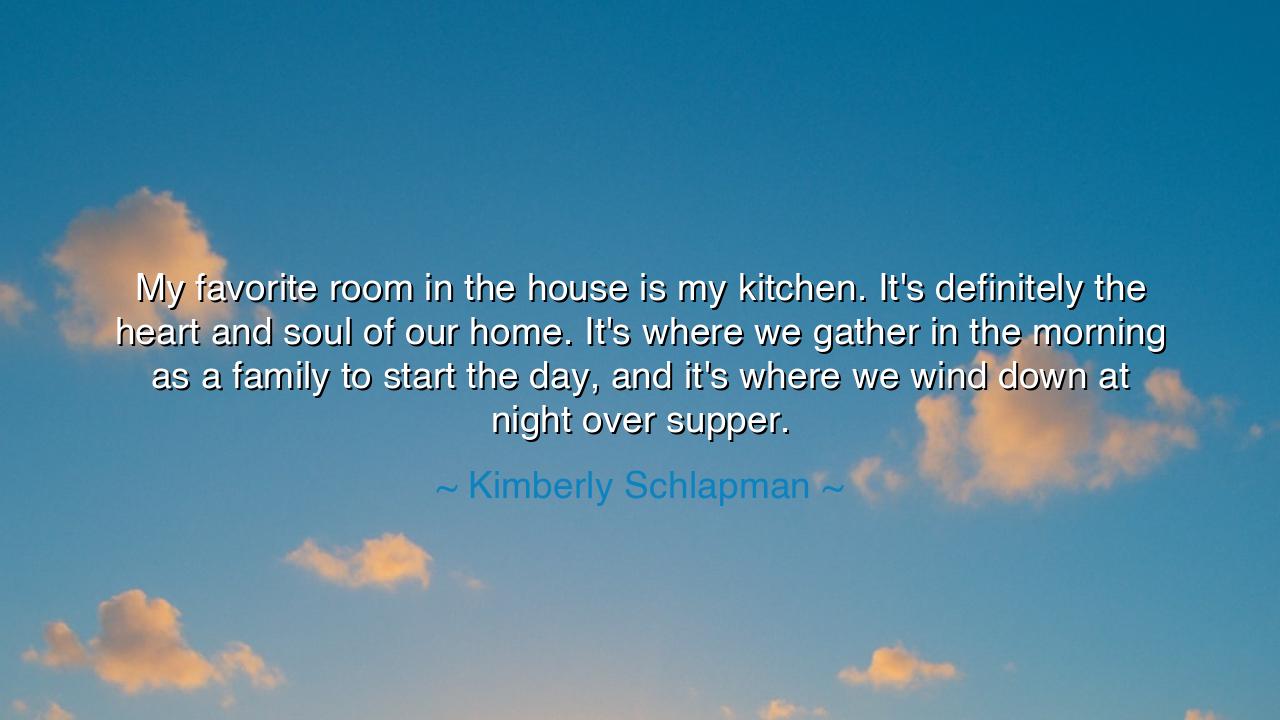
My favorite room in the house is my kitchen. It's definitely the
My favorite room in the house is my kitchen. It's definitely the heart and soul of our home. It's where we gather in the morning as a family to start the day, and it's where we wind down at night over supper.






In the words of Kimberly Schlapman, “My favorite room in the house is my kitchen. It's definitely the heart and soul of our home. It's where we gather in the morning as a family to start the day, and it's where we wind down at night over supper.” — we hear a truth that reaches beyond walls and furniture, beyond food and fire. These words speak of the sacredness of gathering, of the quiet miracles that occur in ordinary places. The kitchen, to her, is not merely a room of work, but a temple of warmth, love, and renewal — the true heart and soul of family life. Beneath this simple description lies an ancient reverence: the idea that the sharing of bread is the sharing of life itself.
The meaning of her words lies in the timeless understanding that nourishment is not only of the body, but also of the spirit. In the kitchen, both forms of sustenance are prepared. The food that fills the belly and the laughter that fills the heart are made side by side, inseparable. When she says that it is “the heart and soul of our home,” she reminds us that a house becomes a home not through its grandeur or design, but through the presence of love that dwells within it. The kitchen, where the family begins and ends each day, becomes the altar upon which life’s simplest joys are offered and received.
The origin of this truth lies deep in the story of humankind. From the dawn of civilization, the hearth was the center of every dwelling — the fireplace, the source of warmth, the place where the first meals were cooked and the first stories told. Around that fire, tribes became families, and families became communities. The hearth was so sacred that the ancients built their homes around it, not above it. In ancient Greece, even the goddess Hestia was worshiped as the spirit of the hearth — for to keep the fire burning was to keep life itself alight. Kimberly Schlapman’s words are the echo of that same ancient reverence — the recognition that, though centuries have passed and the world has grown cold in its speed, the kitchen flame still burns as the heart of humanity.
Consider the story of Abraham in the old scriptures, who welcomed three strangers into his tent and set bread and meat before them. He did not know they were messengers of God; he only knew the sacred duty of hospitality. His kitchen — his simple hearth — became the stage for divine encounter. In that moment, feeding others became more than a necessity; it became an act of love and holiness. So too does Schlapman’s reflection remind us that to cook for those we love is to perform a quiet kind of grace, to give not only sustenance but affection, presence, and time.
Her words also reveal the rhythm of a life well lived — beginning together, ending together. “We gather in the morning to start the day,” she says, and “wind down at night over supper.” In this simple pattern lies the secret of harmony. The day begins with unity and ends with reflection; the family rises and rests as one. In the modern age, where so many are pulled apart by the busyness of the world, her statement is a gentle call back to balance. The kitchen becomes a circle, drawing everyone inward again, reminding us that no matter where we go, we return to the same fire, the same warmth, the same shared table.
It is easy to overlook the quiet power of such spaces, yet they are the foundation of peace. In every culture, the kitchen or hearth has been the keeper of continuity — the place where generations meet, where the recipes of grandmothers become the comfort of grandchildren, and where the act of cooking becomes the language of love. A home without such gathering loses its pulse. To light a stove, to stir a pot, to share a meal — these are acts that keep not only bodies alive, but the soul of a family burning bright.
The lesson of this quote, then, is one of presence and gratitude. Cherish your hearth, whatever form it takes. Guard your moments of togetherness as sacred. In the rush of days, take time to gather — in the morning before the world awakens, and in the evening when the world quiets again. Let your kitchen, or your own chosen space of gathering, be a place of kindness, laughter, and listening. Fill it not only with the smell of food, but with the warmth of love, the laughter of children, and the peace of belonging.
And so, my children, remember this: the true heart and soul of life is not found in wealth or fame, but in the moments shared over simple meals, in the quiet company of those we love. Keep your hearth burning — whether it is the flame of a candle, the glow of a stove, or the spark of joy in your family’s eyes. For as long as there is warmth, as long as there is bread broken in love, and as long as there is laughter echoing in your kitchen, the spirit of home — and of humanity itself — will never fade.






AAdministratorAdministrator
Welcome, honored guests. Please leave a comment, we will respond soon